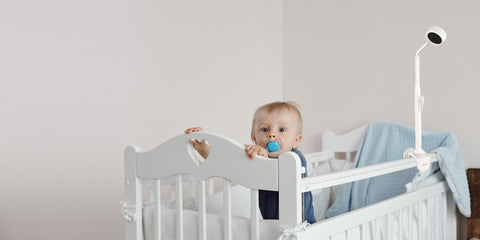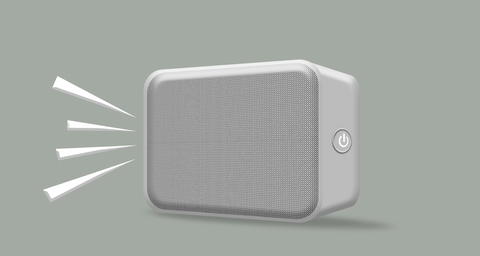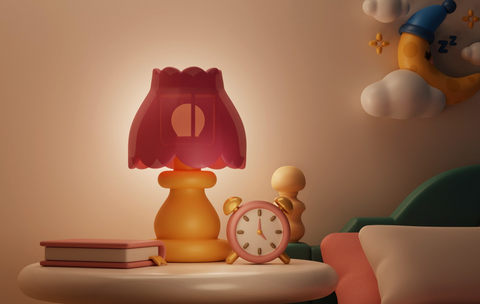Tips for getting a baby to fall asleep fast
The arrival of a new baby brings immense joy to the entire family. However, many parents, especially first-time parents, often face challenges with their children's sleep. When kids struggle to fall asleep at the right time, it can leave parents feeling exhausted and drained throughout the day. Additionally, there is the concern that inadequate sleep may affect a child's overall health and development. To support you during this time, we are pleased to offer the following suggestions, hoping they will provide you with some helpful insights.


- Don't overthink
-
Resist the urge to excessively research and overwhelm yourself with information. We understand that when you're sleep-deprived, your primary focus is on getting some much-needed rest. However, it's important not to overload yourself with too much information on how to put your baby to sleep. Too many sources can lead to confusion and anxiety, hindering the establishment of a consistent and reliable sleep routine for your baby.
-
Trust your instincts. Have confidence in your own judgment and give your chosen approach a chance to work. It may take several attempts, or even days or weeks, for your baby to develop good sleep habits. Persistence is key.

-
Practice relaxation. While your baby relies on your assistance to relax and fall asleep, they will gradually learn to fall asleep independently as they grow older. Therefore, try to relax your mind and give your baby time to learn this essential skill.
As soon as you notice signs of tiredness, such as frowning, yawning, or stiff movements, promptly put your baby to sleep.
A consistent bedtime routine can signal to your baby that it's time for bed. This routine may include a calming bath, storytime, and cuddling.
A consistent bedtime routine can signal to your baby that it's time for bed. This routine may include a calming bath, storytime, and cuddling.
-
Empower your partner

If you are a mother who has recently given birth, you are going through a period that requires both physical and mental recovery. During this time, involving the father in the care of the newborn is essential. It not only strengthens the bond between the father and the baby but also provides you with much-needed rest to facilitate your physical recovery, enabling you to provide better care for your baby in the long run. Trust your partner and allow them the opportunity to care for the baby when you feel tired or overwhelmed. Recognize and appreciate their contributions to parenting.
-
Establish a safe sleeping environment

In accordance with the guidelines from the American Academy of Pediatrics (AAP), it is recommended that parents share a room with their babies for at least the first six months. However, it is important to note that babies should never sleep in the same bed as their parents. Instead, babies should be placed on their backs on a firm and flat sleep surface, unless otherwise advised by a physician for specific pediatric reasons. Room-sharing offers several benefits, including easy access to attend to your baby's needs and a sense of security and safety that extends beyond infancy. It is crucial to consider potential hazards such as overheating and secondhand smoke. Ensure that your baby's sleeping area is well-ventilated, with open windows when possible. Room-sharing with parents can provide additional safety benefits and help reduce the risk of Sudden Infant Death Syndrome (SIDS) to some extent.
-
Utilize a white noise machine

Using a white noise machine can aid in your baby's ability to fall asleep more easily. The concept behind this is that white noise creates an environment reminiscent of the womb, which is comforting and familiar to infants, facilitating quicker sleep onset.
If you don't have access to a white noise machine, you can create a similar effect on your own. For example, you can record the sound of rain on your smartphone and adjust it to a moderate volume, providing a soothing background noise for your baby's sleep environment.
-
Harness the power of music
Playing continuous recordings of your baby's favorite lullabies can assist them in self-soothing when they wake up. It's crucial to ensure that the recording is seamless without any gaps or periods of silence, as this can potentially disrupt your baby's sleep and make them more alert. Furthermore, you can create a personalized lullaby medley using your own voice, as the familiarity and comfort of your voice can have a soothing effect on your baby, helping them fall asleep more easily.
-
Employ the tissue technique
One effective method is to softly and slowly glide a dry, soft tissue over your baby's face in a gentle manner, repeating the motion until their eyes begin to close. Once you notice signs such as a frown or yawn, it's a good indication that your baby is ready for bed. This simple technique can work wonders and help your baby fall asleep consistently.
It's important to ensure that the tissue used is dry and soft to avoid any discomfort that could hinder your baby's ability to fall asleep comfortably.
It's important to ensure that the tissue used is dry and soft to avoid any discomfort that could hinder your baby's ability to fall asleep comfortably.
-
Harness the power of light

Light plays a significant role in regulating our sleep cycle. Understanding and utilizing light appropriately can help your baby establish healthy sleep habits. Here are some tips to incorporate light into your baby's sleep routine:
During the daytime, ensure your baby is exposed to ample natural light by spending time outdoors or providing a well-lit environment indoors. This helps align their biological clock and establishes a daytime routine. However, when it comes to daytime naps, it's advisable to create a well-lit environment to avoid associating darkness with sleep.
During the daytime, ensure your baby is exposed to ample natural light by spending time outdoors or providing a well-lit environment indoors. This helps align their biological clock and establishes a daytime routine. However, when it comes to daytime naps, it's advisable to create a well-lit environment to avoid associating darkness with sleep.
As evening approaches, gradually lower the lighting in your home to promote a sense of sleepiness. Dimming the lights up to two hours before bedtime can create a more conducive atmosphere for restful sleep. Avoid sudden changes in lighting between rooms, as this can confuse your baby's brain and disrupt their sleep.
Using a small, cool-to-the-touch nightlight in your baby's room is acceptable, but ensure it is placed away from bedding or drapes. However, if your baby wakes up during the night, it's best not to turn on any bright lights or bring them into a well-lit room. Sudden shifts from darkness to bright light can signal to their brain that it's time to wake up. Instead, soothe them back to sleep in their dimly lit bedroom.
If early morning sunlight disrupts your baby's sleep or they struggle to nap during the afternoon, consider using blackout curtains. These curtains block external light and help maintain the desired lighting conditions for restful sleep.
-
Set the ideal bedroom temperature and humidity
Creating the right environment for your baby's sleep involves managing the bedroom temperature and humidity. Consider the following tips:
-
Aim for a consistent temperature of around 70 degrees Fahrenheit (21 degrees Celsius) in the bedroom. This temperature range is generally comfortable for sleep.
-
Maintain a relative humidity level of around 50 percent. This balanced humidity helps prevent dry air, which can cause stuffy noses and disrupt sleep. However, be cautious of excessively high humidity levels, as they can promote the growth of allergens and molds.
-
During dry winter months, you can use a warm mist vaporizer in your baby's sleeping area to add moisture to the air. This not only improves humidity but also enhances air quality by removing allergens and viruses. Additionally, the gentle humming sound produced by the vaporizer may help mask other noises and promote uninterrupted sleep for your baby.
Remember to regularly clean and maintain the vaporizer to ensure optimal performance and reduce the risk of mold or bacteria buildup.
-
Address wet or soiled diapers
While some babies can comfortably sleep with wet diapers without disturbance, others may be more sensitive to it. If your baby can sleep through wearing wet diapers without any issues, there is no immediate need to wake them for a change. However, if your baby tends to be sensitive to wetness, it is advisable to change their diapers before putting them to bed. Neglecting to do so may result in a fussy baby in the middle of the night, leaving you exhausted throughout the day. By understanding your baby's individual needs and preferences, you can make an informed decision on whether or not to change their diapers before bedtime, ensuring a comfortable and uninterrupted sleep for both you and your baby.
-
Establish consistent bedtimes and bedtime rituals
While it may not always be possible to adhere to strict bedtime schedules due to late work hours or other commitments, it's important to make the most of the time you have with your baby. Use this time to bond and engage in activities that promote relaxation and winding down.
Familiar bedtime rituals play a significant role in preparing your baby for sleep. Babies' developing brains recognize and store sequences of activities, creating patterns. By establishing a consistent sequence of events such as a warm bath, rocking, nursing, and lullabies, you are programming your baby to associate these actions with sleep. This concept, known as patterns of association, helps the baby understand that sleep follows the early part of the bedtime ritual, facilitating an easier transition into slumber.
In certain family situations, adjusting the schedule to include a later afternoon nap and a later bedtime may be more practical. It's essential for parents to consider their own schedules and family routines when determining an appropriate bedtime. Babies are adaptable and can adjust to different schedules if it means more quality playtime and one-on-one interaction with their parents. The key is to maintain consistency and establish age-appropriate bedtimes that support your baby's ability to sleep through the night.
By prioritizing consistent bedtimes and incorporating soothing rituals, you can help your baby develop healthy sleep patterns and improve their overall sleep quality.
Familiar bedtime rituals play a significant role in preparing your baby for sleep. Babies' developing brains recognize and store sequences of activities, creating patterns. By establishing a consistent sequence of events such as a warm bath, rocking, nursing, and lullabies, you are programming your baby to associate these actions with sleep. This concept, known as patterns of association, helps the baby understand that sleep follows the early part of the bedtime ritual, facilitating an easier transition into slumber.
In certain family situations, adjusting the schedule to include a later afternoon nap and a later bedtime may be more practical. It's essential for parents to consider their own schedules and family routines when determining an appropriate bedtime. Babies are adaptable and can adjust to different schedules if it means more quality playtime and one-on-one interaction with their parents. The key is to maintain consistency and establish age-appropriate bedtimes that support your baby's ability to sleep through the night.
By prioritizing consistent bedtimes and incorporating soothing rituals, you can help your baby develop healthy sleep patterns and improve their overall sleep quality.
-
Establish predictable and consistent nap routines
To help your baby develop healthy daytime nap routines, identify the times of day when you typically feel the most exhausted, such as around 11:00 a.m. or 4:00 p.m. Make an effort to lie down with your baby at these times every day for approximately one to two weeks. This consistent routine not only helps your baby become accustomed to a regular nap schedule but also provides you with an opportunity to rest during the day when you need it the most.
Consistent daytime nap routines have the added benefit of promoting longer stretches of sleep at night. By establishing predictable nap times, you are helping your baby establish a natural sleep-wake cycle and encouraging better nighttime sleep.
Consistent daytime nap routines have the added benefit of promoting longer stretches of sleep at night. By establishing predictable nap times, you are helping your baby establish a natural sleep-wake cycle and encouraging better nighttime sleep.
-
Practice a moment of pause before attending to your baby
During the early stages of your baby's sleep, it is common for them to wake up after a few hours. When they do, they may fuss or make noises. Instead of immediately responding, try waiting a few minutes before attending to your baby. This brief pause gives them an opportunity to self-soothe and potentially fall back asleep without needing your immediate presence.
By refraining from rushing to your baby's side at every noise or whimper, you avoid reinforcing their dependence on your comfort to fall asleep. If your baby is unable to settle back to sleep on their own and it sounds like they're fully waking up, it is advisable to intervene before they escalate into a full-blown crying episode. By stepping in before they reach an overtired state, it becomes easier to calm them back to sleep.
Additionally, consider adjusting the volume on your baby monitor. Lowering the volume to a level where you can still hear distress signals but not every minor sound allows you to be alerted when your baby needs you without being overly sensitive to every little noise.
By refraining from rushing to your baby's side at every noise or whimper, you avoid reinforcing their dependence on your comfort to fall asleep. If your baby is unable to settle back to sleep on their own and it sounds like they're fully waking up, it is advisable to intervene before they escalate into a full-blown crying episode. By stepping in before they reach an overtired state, it becomes easier to calm them back to sleep.
Additionally, consider adjusting the volume on your baby monitor. Lowering the volume to a level where you can still hear distress signals but not every minor sound allows you to be alerted when your baby needs you without being overly sensitive to every little noise.

